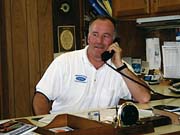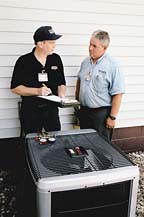
"When you sell comfort, you are selling something customers want and need, not just quoting them a price like so many of your competitors," explained Philip Favret, vice president of The Favret Company, Columbus, Ohio. "This is a way to sell up to higher-efficiency equipment, which is better for the customer, the dealer, the distributor, and the manufacturer."
The Favret Company certainly has credibility. It earned $6.6 million last year and has been in business since 1924. This is a third-generation family business, with the fourth generation just starting to work full time.
"We do the simple things right: show up on time, have clean trucks, clean uniforms, friendly employees, boot covers, and reminder phone calls," said Favret.
"Do the job correctly the first time, no matter the time and money involved. You will have fewer costs in the long run through fewer callbacks and more referrals. You may lose money or break even on a job today, but it will bring you easier profits in the future.
"Don't always be so focused on the money," he summarized. "Provide good customer service and the profits will follow."
The Carrier dealer knows his company will have to sell value. "We will not all be able to compete on price and service," he said. "We need to focus on what the customer wants and needs. We will need to sell comfort solutions, including indoor air quality, airflow improvements, system quietness, and improved warranties."
Since the company is mostly in the add-on/replacement and service business, it deals with a lot of older homes, which benefit greatly from humidifiers and air filters. "We are starting to see a bigger interest in ultra-violet lights. And energy recovery/heat recovery ventilators are a great comfort solution in some of the newer homes we visit."

Educate The Customer
According to Brent Braker, president of Garber Heating & Air Conditioning, Morton, Ill., "Value is easily sold once you can educate the customer of the differences and benefits. Seldom are we the low bidders or even the second lowest, for that matter. But we most often are the best value for the money."Braker said he is surrounded by good contractors, but his company takes that next step when sitting down with customers. "It may be the first time they have been talked to about variable-speed or two-stage equipment.
"I think that not bringing these issues up with a customer is doing them a huge disservice. This equipment is going into someone's home for the next 15 to 20 years, and they are going to be living with the comfort and utility bills. To assume that someone wants it cheap and trying to be low on a bid is not the best way to address this issue."
Braker said he has been quoting high-efficiency systems since before the 13 SEER minimum efficiency standard was mandated. "Most of our quotes, whether replacement or new construction, are for the highest possible efficiency equipment, even with the possibility of 10 SEER that we have now," he said. "No changes have been made in our methods because the minimum is still that, the minimum. Why limit your possibilities and the customers' total investment benefits."
If a contractor is not selling higher efficiency by now, he had better do so in a hurry, advised Braker. "I don't think anything will change the contractor's mindset other than 13 will be the new 10," he said. "In order for the true change to occur, the contractor or salesman must understand the value of the higher-efficiency equipment and believe that the product will be the best for the customer. Otherwise, they will not encourage higher efficiency and higher satisfaction. They will end up with an alright sale and a customer who doesn't know any better."

Sell Like The Auto Industry
Randy Gibbs does not believe the contracting world in general knows how to sell value or comfort."A large percentage of contractors have never sold on value and high efficiency," said the president of Brody-Pennell Heating & Air Conditioning, Los Angeles. "They merely sell on being the lowest price. Therefore, they will sell only the minimum efficiency and R-22 until it is obsolete."
Just look at the automobile industry when it comes to selling value, he said. "You bundle all the features they said they wanted in their comfort system. Then you show them how they can afford that system through financing and energy savings," explained Braker.
"People want the same comfort they have in their cars. Think about it. They can control the speed of the air, where the air is going - right, left, or in the rear section - and large quantities of cars now have high-efficiency filtration."
In Dan Troyer's perspective, there is a greater profit margin on higher-efficiency products and add-on accessories. Why would you want to sell differently?
"There are some who believe in a small markup as the prices increase," said Troyer, the owner of Danco, East Peoria, Ill. "However, I believe this is incorrect. The technology and features warrant the higher prices. We should put the same markup across the board."
Troyer said the labor to install a 14-SEER system is the same as a 10 SEER, "but you put at least $250 more in your pocket" for a 14-SEER system. He compared it to installing programmable vs. nonprogrammable thermostats: The labor is the same but the unit price is different. In regard to accessories, if a technician is on the job with tools available, he asked, how long would it take to install an accessory like a humidifier?
"Leveraging the labor you have is important," Troyer said. "Which would you rather have, a man who makes $500 per day for you, or a man that makes $1,000 per day for you? You are not going to make $1,000 per day putting in 10-SEER air conditioners."
In regard to accessories, James Griffin, president of Weather Engineers, Jacksonville, Fla., zeroes in on energy recovery ventilators and air cleaners. It works for the 42-year-old business, which turned in a revenue of more than $11 million last year.
"Provide what the customers want," said the Bryant dealer, "because the customer writes our paycheck. If we have satisfied customers and charge for our services, we will be successful."
Offer More
Some contractors will not sell up - period, said Troyer. "That gives us an advantage to quote options others will not quote."If everyone is quoting 13 SEER, it is a price war, no matter what. If you have something else to offer, you can take the focus off the price and make a greater profit on a better system." In Troyer's case, he prefers to sell the value of higher-end products with a presentation folder or a laptop computer.
"People do not drop $8,000 for a system when they get an estimate for $4,000 that heats and cools, without seeing the value they are buying," explained the contractor. "You can say that yours is better, which is why it is twice as much. However, if you do not have concrete information to back up your statement, the customer just thinks you are high priced.
"I believe you need to have some formal training in order to sell value," he added. "It is not something that you can expect a salesperson to know on his own."
The successful contractor will always sell value, said Ken Justo, vice president of sales and marketing, ASI Hastings, El Cajon, Calif. "But that might be putting the cart before the horse," he interjected. "Assuming - and this is a big assumption - that the manufacturers and distributors have a good understanding of the products they are offering, I think the biggest challenge in tomorrow's business climate will be to sell ourselves. So the first challenge will be for us to make the time to educate our organizations so that we can properly educate our customers and apply our products to their needs.
"This may not be as easy as it sounds, because while we are educating ourselves, we still have to run a business and make a profit."
Sidebar: Give Customers A Reason To Spend The Money
Successful contractors interviewed byThe Newswere asked if they believed this simple statement: "People will spend the money; we just have to give them the reason to spend it." Here are their respective answers:
"You can go to Best Buy and buy a wide screen TV for $1,500, or one for $5,000. They are the same size. Why would anyone buy the $5,000 one? Not everyone does. But it does say two things: (1) It creates a higher-priced middle-of-the-road system; and (2) It allows the person that wants the best to get it. It is the same with HVAC. If you only offer two choices, they will usually take the lower one. If you offer three, they will take the middle one."
- Dan Troyer, owner, Danco, East Peoria, Ill.
"The statement is true. A glass of water from the tap is so inexpensive it is practically free. Yet, I drink bottled water at the office every day. A Kia is the lowest priced car in America, yet Toyota outsells them every day."
- Dewey Jenkins, president, Morris-Jenkins Co., Charlotte, N.C.
"Many will, but this does not mean they should or should not. I do believe that if we can help them identify their needs and educate them about the products that remedy those needs, the money is not an issue. It's like the product is free. We give them the comfort and the relief they seek. They write a check. It's painless if we hold up our end of the bargain."
- Ken Justo, vice president of sales and marketing, ASI Hastings Inc., El Cajon, Calif.
"First of all, the customer must have a need. They are not going to spend their hard-earned money unless there is a need to do so. Most people do not plan for a major expense like replacing an HVAC system. We feel like it is our duty to the customer to advise them in the most sincere manner on how to choose a new system that gives value as well as a sound investment."
- Phil Smith, vice president, Albany Air Conditioning & Heating Co., Albany, Ga.
"Yes, by showing customers what's available, they often choose better units."
- Wayne Beck, president, Aladdin Air Conditioning and Heating Inc., Newbury Park, Calif.
"‘A person's home is generally their largest investment,' is a phrase that we all have heard and know to be true. The heating and air conditioning system can be a significant investment in the home. The benefits that we have, as HVAC contractors, is that our systems are only part of that home that actually is an investment. The higher the efficiency equipment we sell them, the more money they save in utility costs every increasing year. If you can successfully explain this, people will buy more-efficient equipment because it is a true benefit to them."
- Brent Braker, president, Garber Heating & Air Conditioning Inc., Morton, Ill.
"Yes. We must educate the customer, make the customer feel comfortable with us, and allow the customer to make his/her own decisions."
- Kevin West, owner, West Installation Co., Springfield, Ohio
Publication date: 09/12/2005



